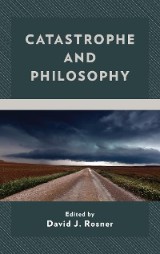Details

Catastrophe and Philosophy
|
CHF 95.00 |
|
| Verlag: | Lexington Books |
| Format: | EPUB |
| Veröffentl.: | 04.12.2018 |
| ISBN/EAN: | 9781498540124 |
| Sprache: | englisch |
| Anzahl Seiten: | 370 |
DRM-geschütztes eBook, Sie benötigen z.B. Adobe Digital Editions und eine Adobe ID zum Lesen.
Beschreibungen
<span>This book takes a different approach to the history of philosophy, exploring a neglected theme, the relationship between catastrophe and philosophy. The book analyzes this theme within texts from ancient times to the present, from a global perspective. The book’s focus is timely and relevant today, as the planet is certainly facing a number of impending catastrophes right now, e.g., environmental degradation, overpopulation, the threat of nuclear war, etc. </span>
<span>This book investigates how a number of influential philosophies arose out of catastrophes, such as wars, plagues, and earthquakes. Central to the project is an explanation of how these catastrophes led to the questioning of basic assumptions and the introduction of new ideas to make sense out of a chaotic and often unintelligible world. </span>
<br>
<br>
<span>Introductory Essay: Catastrophe and the Limits of Understanding, by David J. Rosner</span>
<br>
<br>
<br>
<br>
<span>Part I: The Ancient World</span>
<br>
<br>
<br>
<br>
<span>Catastrophe and Enlightenment: The Genesis of Buddhism's First Noble Truth, by JeiDong Ryu</span>
<br>
<br>
<span>The Missing God: Voices of Despair and Empathy in the Book of Lamentations, by Sarah K. Corrigan</span>
<br>
<br>
<span>Patterns of Post-Catastrophic Thought in Ancient China: The Growth of Philosophy after the Warring States Period, by Kwon Jong Yoo</span>
<br>
<br>
<span>Athens in Ruins: Plato and the Aftermath of the Peloponnesian War, by John Ross</span>
<br>
<br>
<br>
<br>
<span>Part II: The Middle Ages/Renaissance</span>
<br>
<br>
<br>
<br>
<span>Augustine’s Anti-Catastrophe, by Steven Cresap</span>
<br>
<br>
<span>Values in the Time of Plague: Civilizational Trauma and Moral Nihilism in Boccaccio's Decameron, by David J. Rosner</span>
<br>
<br>
<span>The Search for Stability in Chaotic Times: Machiavelli, by Diana Prokofyeva</span>
<br>
<br>
<br>
<br>
<span>Part III: Modernity I: Early Modern Period</span>
<br>
<br>
<br>
<br>
<span>Three Catastrophes and One Philosopher: Atrocious Wars, and the Political Ideas of Thomas Hobbes, by David Wilkinson</span>
<br>
<br>
<span>“A New Philosophy Calls All into Doubt”: The Epistemological Crises of Early Modernity (and why they matter now), by David J. Rosner & Steven Cresap</span>
<br>
<br>
<span>The Metaphysics of Catastrophe: Voltaire's Candide, by Carsten Meiner</span>
<br>
<br>
<br>
<br>
<span>Part IV: Modernity II: High Modernity</span>
<br>
<br>
<br>
<br>
<span>Nietzsche and the Catastrophe of Nineteenth Century Democracy, by Phil Washburn </span>
<br>
<br>
<span>Wittgenstein and Pre-War Hapsburg Vienna, by John Ross</span>
<br>
<br>
<span>Atonality in Music and the Upheavals of High Modernity, by Robert Quist</span>
<br>
<br>
<span>Toynbee: From the Great War Catastrophe through the Philosophy of History to the Theory of Civilizations, by David Wilkinson</span>
<br>
<br>
<span>Catastrophe and Decadence in The Great Gatsby, by Peter Wakefield</span>
<br>
<br>
<span>Deep Silence in the Holocaust Stories of Tadeusz Borowski, by Nancy Reale</span>
<br>
<br>
<br>
<br>
<span>Part V: Post-Modernity</span>
<br>
<br>
<br>
<br>
<span>States of Exception and the Problem of Detention in Post 9/11 American Jurisprudence, David Chalfin</span>
<br>
<br>
<span>Swords of Damocles: An Essay on Catastrophe and Globalization, by Pedro Geiger</span>
<br>
<br>
<br>
<br>
<span>Part VI: Conclusion</span>
<br>
<br>
<br>
<br>
<span>Concluding Postscript: Coping with Catastrophe: Developing Pathways towards Resilience </span>
<br>
<br>
<span>Primary Life Orientations and Philosophical Response to Catastrophe, by Marek Celinski</span>
<br>
<span>Introductory Essay: Catastrophe and the Limits of Understanding, by David J. Rosner</span>
<br>
<br>
<br>
<br>
<span>Part I: The Ancient World</span>
<br>
<br>
<br>
<br>
<span>Catastrophe and Enlightenment: The Genesis of Buddhism's First Noble Truth, by JeiDong Ryu</span>
<br>
<br>
<span>The Missing God: Voices of Despair and Empathy in the Book of Lamentations, by Sarah K. Corrigan</span>
<br>
<br>
<span>Patterns of Post-Catastrophic Thought in Ancient China: The Growth of Philosophy after the Warring States Period, by Kwon Jong Yoo</span>
<br>
<br>
<span>Athens in Ruins: Plato and the Aftermath of the Peloponnesian War, by John Ross</span>
<br>
<br>
<br>
<br>
<span>Part II: The Middle Ages/Renaissance</span>
<br>
<br>
<br>
<br>
<span>Augustine’s Anti-Catastrophe, by Steven Cresap</span>
<br>
<br>
<span>Values in the Time of Plague: Civilizational Trauma and Moral Nihilism in Boccaccio's Decameron, by David J. Rosner</span>
<br>
<br>
<span>The Search for Stability in Chaotic Times: Machiavelli, by Diana Prokofyeva</span>
<br>
<br>
<br>
<br>
<span>Part III: Modernity I: Early Modern Period</span>
<br>
<br>
<br>
<br>
<span>Three Catastrophes and One Philosopher: Atrocious Wars, and the Political Ideas of Thomas Hobbes, by David Wilkinson</span>
<br>
<br>
<span>“A New Philosophy Calls All into Doubt”: The Epistemological Crises of Early Modernity (and why they matter now), by David J. Rosner & Steven Cresap</span>
<br>
<br>
<span>The Metaphysics of Catastrophe: Voltaire's Candide, by Carsten Meiner</span>
<br>
<br>
<br>
<br>
<span>Part IV: Modernity II: High Modernity</span>
<br>
<br>
<br>
<br>
<span>Nietzsche and the Catastrophe of Nineteenth Century Democracy, by Phil Washburn </span>
<br>
<br>
<span>Wittgenstein and Pre-War Hapsburg Vienna, by John Ross</span>
<br>
<br>
<span>Atonality in Music and the Upheavals of High Modernity, by Robert Quist</span>
<br>
<br>
<span>Toynbee: From the Great War Catastrophe through the Philosophy of History to the Theory of Civilizations, by David Wilkinson</span>
<br>
<br>
<span>Catastrophe and Decadence in The Great Gatsby, by Peter Wakefield</span>
<br>
<br>
<span>Deep Silence in the Holocaust Stories of Tadeusz Borowski, by Nancy Reale</span>
<br>
<br>
<br>
<br>
<span>Part V: Post-Modernity</span>
<br>
<br>
<br>
<br>
<span>States of Exception and the Problem of Detention in Post 9/11 American Jurisprudence, David Chalfin</span>
<br>
<br>
<span>Swords of Damocles: An Essay on Catastrophe and Globalization, by Pedro Geiger</span>
<br>
<br>
<br>
<br>
<span>Part VI: Conclusion</span>
<br>
<br>
<br>
<br>
<span>Concluding Postscript: Coping with Catastrophe: Developing Pathways towards Resilience </span>
<br>
<br>
<span>Primary Life Orientations and Philosophical Response to Catastrophe, by Marek Celinski</span>
<span>David J. Rosner</span>
<span> is associate professor of values and ethics, School for Business, Metropolitan College of New York.</span>
<span> is associate professor of values and ethics, School for Business, Metropolitan College of New York.</span>

















